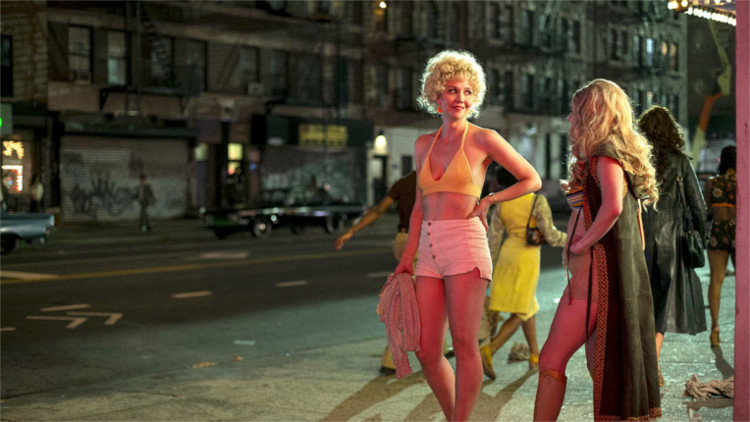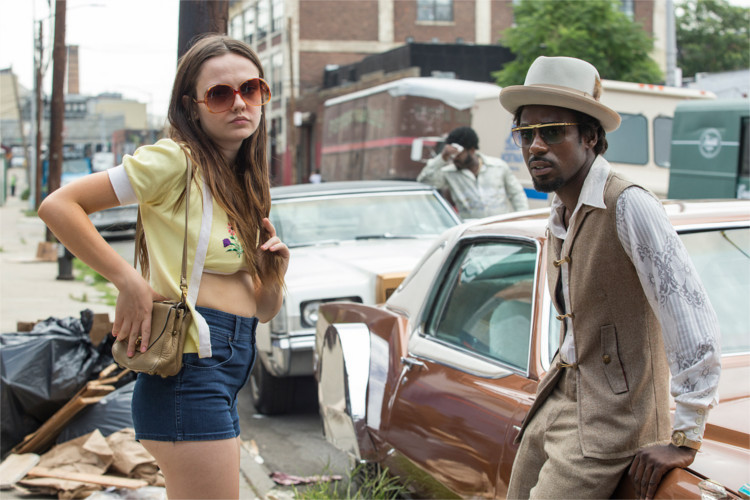TV Review | The Empathy of David Simon’s The Deuce
Sex sells. That has long held sway as maybe the most salient truth in the entertainment industry, an unchanging foundation on which so much of our world is built. HBO has never been afraid to embrace this ethos with it’s programming, a policy that has undoubtedly played a significant part in the network’s ascent to market dominance through the first decade of this new century. A frankness about sex with shows like The Sopranos and The Wire is what helped announce television as the new medium for adults but, though HBO’s liberal approach to sex is a significant contributing factor to it’s success, it has also proven controversial and increasingly outdated as it’s status has transformed from transgressive into cynically commercial. Game of Thrones and Westworld became blockbusters to some degree because of their explicit content but that same content has also attracted the most negative headlines for both these shows. Now with The Deuce HBO’s interest in the sex trade becomes even more literal.
Considering HBO’s track record it would be understandable if one was to go into The Deuce with certain expectations not just of frankness concerning sex and nudity but a potential sensationalism of those aforementioned qualities. Frankly, it’s not unreasonable that the assumption of a series whose focus is on pornography and prostitution would be that it would be somewhat, well, pornographic. What undercuts this assumption is David Simon. Simon, whose credits include The Wire, Generation Kill, Treme, and Show Me A Hero, is a former journalist who applies a journalistic rigour to his television works. They are nothing less than comprehensively expansive, deeply rooted in fact and free of undue judgement. In other words, far from the sensationalism one might expect of HBO.
The Wire, along with being labelled the greatest television show of all time, has commonly been referred to as television’s version of the great American novel. The former label is debatable, the latter isn’t. No other series in the history of television has so comprehensively outlined the political, social, and economic realities of modern American life. It’s subject is the city of Baltimore, ranging from the world of low level drug dealing all the way up to the office of mayor, and it renders each strata of society in full, unflinching detail that will bear resonances with American life for years to come. It is the most gargantuan piece of Simon’s oeuvre, the most complete manifestation of Simon’s argument for sense and decency in a systematically stupid and callous world. It’s capitalist America in microcosm, in all its glory and ugliness.

It is to The Wire that The Deuce is most immediately reminiscent of among Simon’s catalogue and not simply due to some familiar faces from the former appearing in the latter or some stylistic similarities. Simon has never done small (even the 8 part miniseries Show Me A Hero has a scope that most fully fledged long-form television series’ do not) but The Deuce shares more of the same fundamental DNA with The Wire than any other of Simon’s shows. Both are primarily interested in the crime and politics that defines a city, illustrating how these are not only comparable worlds but social spheres that are intrinsically interrelated. The central thrust of The Wire, what could also be called its connective tissue, was the relation of each character to a bigger picture, both in the guise of the institutions that governed their lives and how their own individual story played a role as part of a larger mosaic. The Deuce operates in the exact same way. And, of course, a fundamental truth to Simon’s work is the refusal to indulge in black and white morality, favouring to examine the murkier grey areas of the world where nothing is completely right or wrong.
[perfectpullquote align=”right” cite=”” link=”” color=”#F42A2A” class=”” size=””]Amidst all this filth and exploitation are moments of real tenderness in unexpected places.[/perfectpullquote]
These are all fundamental qualities of Simon’s work, fundamental features that have reoccured again and again. Yet what truly sets his shows apart from the others, more than their ambition or their insight, is their remarkable level of not just empathy but generosity. Simon’s shows do not judge (bar the overly preachy fifth season of The Wire) nor do they pull their punches. There’s plenty of despicable figures from The Corner to The Deuce but the focus of these shows is to contextualise a person’s actions in a world that renders them understandable no matter how deplorable. These are characters who are merely a product of a system with the most heinous crime possible in this world being not just knowledgable of the wrongs of society but exploiting them for your own gain against all reason (Maurice Levy from The Wire or Hank Spallone from Show Me A Hero). These are shows of clear minded nuance fighting against a world that trivialises and obscures the truth often for self-gain.
Prostitution and pornography is, like most things that concern the female body, extremely controversial as a subject for public discourse. To talk of such topics is to invite the language of faux-modesty and disgust, a dismissal on the grounds of moral superiority that is both useless and an attractive image booster. Sex may sell but sex makes people uncomfortable and is typically avoided as a subject for intellectual discussion. But not everyone is so prurient. Prostitution and pornography are uncomfortable areas of conversation because there is so much legitimate ugliness in both. The misogynistic nature of these industries is undeniable and makes it too unpalatable to appear to strongly or overly endorse. Yet both are fundamental realities of life and unless people suddenly no longer want to have sex there will be a sex trade. And if it is to be a part of life then how we think of it must change to allow us to establish a meaningful conversation around it.

The Deuce does not shy away from the violence or seediness that comes from selling sex. It’s not exactly an attractive life, especially so in seventies New York. Clients are a source of income that can turn violent, pimps offer both protection and constant threat, the police frustrate your ability to make money almost nonsensically. Nothing about The Deuce glamorises either this life or the larger scene that was New York at the time. But The Deuce is remarkably empathetic and this is the show’s single most impressive quality (except for maybe the magnificent performance of Maggie Gyllenhaal). There is an inquisitive open-mindedness into human desire that is commonly derided as mere sinful lust. There would be something almost quaint about this vision of the streets of New York (James Franco’s barman Vincent greets all the prostitutes by name as he walks down the street) if it weren’t for all the grimy violence and unpleasant sex. But The Deuce doesn’t condemn desire. It condemns the culture of silence around it that permits the subjection of women under the worst tendencies of men. But this is not just a story of victimisation. Simon grants his women (and men) too much dignity for that.
Amidst all this filth and exploitation are moments of real tenderness in unexpected places. Maggie Gyllenhaal’s Candy takes a job taking the virginity of a boy on his eighteenth birthday who, unsurprisingly, does not last long. Complaining that he has to pay the same amount as someone who takes longer to finish, she explains her job using his car-salesman father as an example:
That’s his job, right? Someone comes in, knows just the car he wants, doesn’t dick around, doesn’t need a long test-drive, doesn’t argue about the colour, whatever. Does he give him the car for less? Does he pay less than the guy who comes in, takes forever, gotta drive five or six cars, talk about the radio, the white walls, everything else before he’s ready to buy? No. He doesn’t give the easy customer two cars for the price of one, right? This is my job, Stuart – Candy
It’s a concise lesson in economics that would seem to end the discussion there. But after Stu offers her a cheque and, despite the fact she usually strictly takes cash, she relents with a smile. It’s a scene in which a boy pays a woman for sex and it is endearingly sweet. Another prostitute, Darlene (Dominique Fishback), has a client who doesn’t even pay for sex and instead pays for her company to watch movies with like Charles Dickens A Tale of Two Cities. Such instances are undoubtedly anomalous moments of tenderness in a line of work that is an overtly patriarchal structure but they do exist and they display the humanity of all sides of those involved in the sex trade. And, at the end of the day, capturing the complicated nature of humanity is ultimately what Simon does best.

